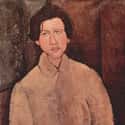-
(#7) Margie Profet
- 60
Evolutionary biologist Margie Profet spent the '80s and early ‘90s publishing controversial, but influential, work regarding menstruation, morning sickness, and allergies, including the groundbreaking idea that menstruation has a function, and isn’t just a by-product. She won the six-figure MacArthur Foundation “genius grant” prize in 1993. In 2005, still living off the prize, she cut ties with her friends and family, and was considered a missing person.
Profet, amazingly, resurfaced and reunited with her family in 2012, thanks in large part to a feature in Psychology Today. She said she did not know anyone was looking for her, and had been in “severe physical pain” for years due to an undisclosed illness. She said she didn’t disclose her whereabouts or condition, because she didn’t want to trouble anyone. Unable to work because of the pain, she spent several years in poverty, “sustained largely by the religion she had come to early in the decade.” It’s unclear what that religion is.
-
(#2) William James Sidis
- Dec. at 46 (1898-1944)
Proto-Doogie Howser William James Sidis (1898-1944) was an impossibly gifted lad: he could reportedly read the New York Times before he was two, knew several languages at six, and even invented his own language before being accepted into Harvard at age 11. The Wes Anderson-character-come-to-life had other interests, too, including writing French poetry, novels, and “a constitution for a utopia.”
But it was his astounding math skills that really wowed the grown-ups at Harvard, where he lectured, at age 11, on four-dimensional bodies. He graduated cum laude at age 16, but never really used his degree. After toiling in grad school, law school, and a professorship, Sidis went into hiding, bouncing from job-to-job and city-to-city, seeking to become a “regular working man.”
He wrote the occasional odd book, often using pseudonyms, including a book all about streetcar tickets under the name Frank Folupa, which his biographer calls "arguably the most boring book ever written." In 1937, he successfully sued the New Yorker for writing a sneaky piece about him he thought “made him sound crazy.” He died in 1944 from a brain hemorrhage, the same thing that killed his father.
-
(#10) Genius Chef Nick Gill Decided to Disappear
At just 21, Nick Gill was the youngest-ever British chef to win a Michelin star. He seemed destined for a life of fame and fortune, and was hailed as a culinary genius. By the time he disappeared, at 42, he had been jailed for attacking his ex-wife and lost contact with his two young children. He was also, reportedly, a “heavy drinker and drug user.”
In 1998, he told his older brother, writer and critic AA Gill, “I’m going to go and disappear. Please don’t look for me.” The elder Gill obliged, and Nick hasn’t been seen since. Strangely, a pencil sketch of Nick done by AA showed up for auction at Christie’s in 2014, but AA says it’s not a sign. “I don’t know where it came from. I didn’t pursue it. If Nick wanted to get in touch with me, I’m not hard to find.”
-
(#5) Chaim Soutine
- Dec. at 50 (1893-1943)
Chaim Soutine, an acclaimed Russian Expressionist painter of Belarusian-Jewish origin, vanished from Paris and the public eye in 1941 to escape the Gestapo. For two years, he traveled, battling a stomach ulcer, with his girlfriend Marie-Berthe Aurenche, sleeping in forests, bouncing from hotel-to-hotel, constantly changing accommodations to avoid detection.
The art world discovered his whereabouts in 1943, after Aurenche took more than 24 hours to stealthily drive him 200 miles back to Paris for treatment for his ulcer (they did not trust any local doctors where they were hiding). Soutine died of internal bleeding on August 9, 1943.
Known best for his vivid paintings of animal carcasses, Soutine’s work was wildly popular in New York during the ‘30s and ‘40s. He was championed as a genius by Italian painter Amedeo Modigliani (responsible for the portrait of Soutine above) as early as 1917, but his work didn’t find acclaim until a prominent American collector purchased all of his work at once in 1922 (now permanently on display at a museum in Merion, PA).
-
(#4) Thomas Pynchon
- 81
Like JD Salinger before him, author Thomas Pynchon is one of the world’s most famous reclusive literary geniuses, except Pynchon has maintained a relatively steady output of novels (Against the Day, Inherent Vice, Bleeding Edge) and even film adaptations (Inherent Vice) since his long, post-Gravity’s Rainbow drought in the ‘70s. Despite this, there are only four known photographs of Pynchon in circulation.
Gravity’s Rainbow earned Pynchon a Pulitzer consideration in 1974 (overruled by the advisory board for being “turgid” and “obscene”), and the William Dean Howells Medal of the American Academy of Arts and Letters in 1975, which he declined via letter: “The Howells Medal is a great honor, and, being gold, probably a good hedge against inflation, too. But I don't want it. Please don't impose on me something I don't want.”
Pynchon has successfully remained out of the public eye his entire career, but he appeared, oddly enough, three times on The Simpsons in animated form. He even sent Executive Producer Matt Selman feedback on his first appearance, cutting a line where he calls Homer a “fat ass.” Pynchon wrote to Selman, “Homer is my role model and I can’t speak ill of him.”
-
(#1) Grigori Perelman
- 52
Russian math god Dr. Grigori Perelman collected the super-prestigious $1,000,000 Clay Mathematics Institute Millennium Prize in 2010 for proving the Poincaré conjecture, and earned the super-awesome nickname “Mathsputin” for rejecting the prize to continue living in squalor with his probably pissed off mother and sister in St. Petersburg. The Poincaré conjecture states, “Every simply connected, closed 3-manifold is homeomorphic to the 3-sphere,” which you have to admit sounds a bit like rejected Pootie Tang dialogue unless you’re a Good Will Hunting-level math wizard.
The wild-bearded Perelman, who turned down teaching offers from Princeton and Berkeley, reportedly lives “extremely humbly,” which is wee bit of an understatement: an “astounded” neighbor said in 2010 that Perelman “only has a table, a stool and a bed with a dirty mattress.” Slightly more recent reports indicate Perelman has “all [he] needs,” and just doesn’t want the attention, likening it to being “on display like an animal in a zoo.”
After Perelman's sudden flight from obscurity to fame, he more or less disappeared from public view, so much so journalists went looking for him. Brett Forrest of British newspaper The Telegraph conducted a stakeout to find the reclusive genius in 2012, and apparently made brief contact with him. Meanwhile, Perelman's Wikipedia page is full of bizarre conjecture like "Some Russian news outlets have indicated that Perelman has had a job in Sweden since 2014" and "In April 2011, Aleksandr Zabrovsky, producer of President-Film studio, claimed to have held an interview with Perelman... A number of journalists believe that Zabrovky's interview is most likely a fake... "
New Random Displays Display All By Ranking
About This Tool
What is the concept of IQ 167? If your IQ is 167, congratulations, you can be compared with famous historical figures such as Einstein, Hawking, and Bohr. There are geniuses in history who fight for scientific research, and some geniuses were famous for their clever crimes, there are also some geniuses who have puzzled the world because of their mysterious disappearance. People made many speculations about their disappearances.
The random tool introduced 10 geniuses in history who vanished or went into hiding, their theoretical results have promoted the development of the times and made contributions to research in different fields.
Our data comes from Ranker, If you want to participate in the ranking of items displayed on this page, please click here.















